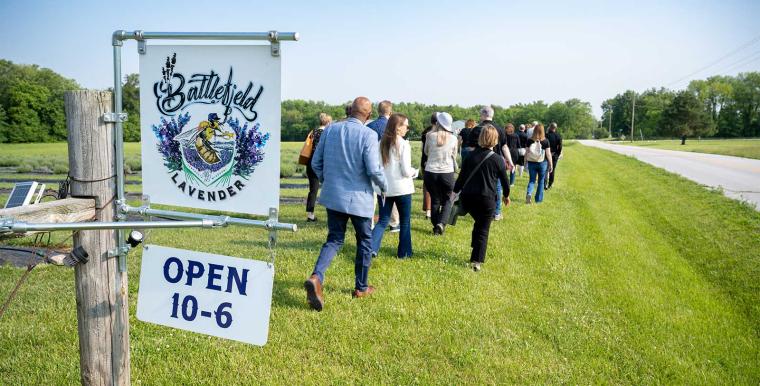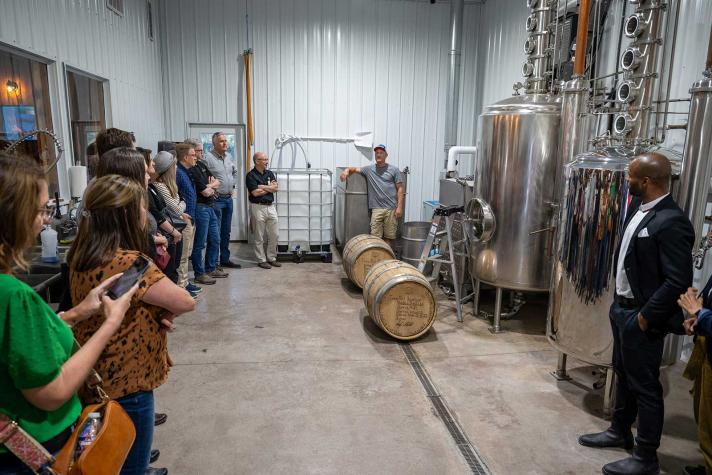What do a lavender farm, a distillery, a lively coffee shop, dozens of cover crop test plots and a college and careers pathway program for youth have in common? They show how the University of Missouri works to strengthen Missouri’s economy and empower people to improve their lives.
On May 25, MU Extension hosted 27 MU deans and administrators on a six-stop tour through northeastern Missouri. The tour showcased extension’s work on the state’s grand challenges around agriculture, economic opportunity, education and health. It also gave university leaders a look at partnership opportunities across an area that stretches north from Boone County to the Iowa border and east to the Mississippi River and historic Hannibal.
“This is a way to unite our campus with our greater statewide ‘campus’ and open avenues for incredible collaborations across campus and with communities we serve throughout Missouri,” said Chad Higgins, interim vice chancellor for extension and engagement.
Value-added agriculture
The first stop was Battlefield Lavender in Centralia. The 3-acre farm, planted with fragrant English lavender varietals, is a value-added agriculture success story, said MU Extension Northeast Region Director Mike Krauch.
Owners Katie and Jason Lockwood host farm tours and you-pick visitors and sell lavender-based products at local farmers markets and an on-site store. The university has provided support through soil analysis, grant application assistance and small-business skill-building, the Lockwoods said.
“MU Extension and the advice and resources they shared with us really were such an important part of helping us build our dream into a successful business,” Jason Lockwood said.
Battlefield Lavender now serves as a test site providing data to MU researchers, Krauch said. “This project is a great example of how our collaborations with people like the Lockwoods connect back to researchers on campus, who then can help develop best practices and share that knowledge and experience back out across the state through extension faculty and staff,” he said.
Sustainable agriculture innovations
MU’s support of Missouri’s commercial producers was the focus of the Knox County stop at the Lee Greenley Jr. Memorial Research Farm, part of MU’s statewide Agricultural Experiment Station, which develops and evaluates sustainable and profitable agricultural practices. Presentations and demos at the 700-acre center in Novelty featured drone technology; research on cover crops, drainage and irrigation and fescue seed production; and rice variety and planting date trials.
“It’s all about conducting testing and experiments that allow us to take better ways, resources and practices back to farmers and to address sustainable agricultural needs, all while pushing toward the goal of doubling the value of agriculture’s contribution to Missouri’s economy by 2030,” said senior farm manager Donnie Hubble.
MU Extension also supports the region’s agriculture through extensive training and resources around local food production, horticulture and sustainable pest management, including its Show-Me-Select Replacement Heifer Program and Show Me Quality Assurance, a youth program emphasizing good livestock management practices.
Growing entrepreneurship and thriving communities
Stops at Java Jive in Hannibal and Sweetwater Distillery in Monroe City showcased extension’s business and community development partnerships.
Java Jive is a coffee shop, deli, bakery and gift store on Hannibal’s thriving Main Street. Maria Kuhns, an entrepreneurship specialist with the Missouri Small Business Development Center in Hannibal, explained the role SBDCs play in regional economic development.
Through partnerships between MU and other Missouri universities and economic development partners, SBDC experts provide training, research and confidential one-on-one counseling to new and existing businesses that help communities like Hannibal remain vibrant.
Initiatives like the Creating Entrepreneurial Communities conference share strategies for small-town and rural revitalization. Hannibal and Hermann hosted Missouri’s first two CEC conferences, where participants learned firsthand the opportunities and challenges communities face. In September’s renamed Connecting Entrepreneurial Communities in Benton County, events in Lincoln, Cole Camp and Warsaw will focus on building networks to promote regional economic growth and stability.
In Monroe City, Andy and Heather Utterback’s successful craft distillery offers tastings, tours and bottled distilled spirits made from locally grown grains, including signature Jimmy Red heirloom corn-based spirits.
Heather Utterback, a former extension nutrition program associate in the region, said she “knew there were so many avenues of support and information within extension to help us develop our seed of an idea into a business plan to working on getting grants and funding, which let to our opening five years later in 2020.”
Building community health and resilience
MU Extension’s approach to helping improve Missourians’ lives also includes extensive youth development initiatives such as 4-H; preventive and chronic disease management programs; youth and adult health and nutrition education and more.
The tour provided MU Health Care leaders a closer look at MU’s work in northeastern Missouri to address rural health care delivery needs, said Nim Chinniah, MU vice chancellor for health affairs. “It’s a great way to spend time with colleagues who are in the same type of work and think about the ways in which we engage the community and the ways in which communities need and want that engagement.”
Stops in Paris and Mexico highlighted needs and opportunities for such collaboration.
Outside Boone County and its centralized health care services, only 63 dentists and 129 primary care providers are based in Missouri’s northeast region, according to Jim Meyer, an extension and engagement specialist.
“We need to think creatively about ways to leverage resources to address these deep disparities across our region,” Meyer said.
Lori Popejoy, dean of MU’s Sinclair School of Nursing, said, “I am really interested to know what nursing’s role is in the solutions to the problems of the people of Missouri through an increasing focus on health. This tour helps me understand who can be good collaborators, and where we fit into being part of the solutions.”
In Monroe County, the county commission, county extension council and the community are helping to finance construction of a new extension center in Paris. The building, close to completion, features a community tornado shelter and accessible offices that will host nutrition education and health programs that are targeting the region’s needs.
In Audrain County, tour participants saw how Missouri 4-H meets the diverse needs of youths through programs in healthy living, leadership and civic engagement and college readiness, said Stephanie Femrite, assistant director of Missouri 4-H
“Whether small business support, agricultural innovation and expertise, preventive and community health care collaborations and youth development, MU field and campus leaders and faculty are always looking for ways to fulfill the land-grant university’s mission to serve Missouri and deliver Mizzou,” Krauch said.
Writer: Katherine Foran


